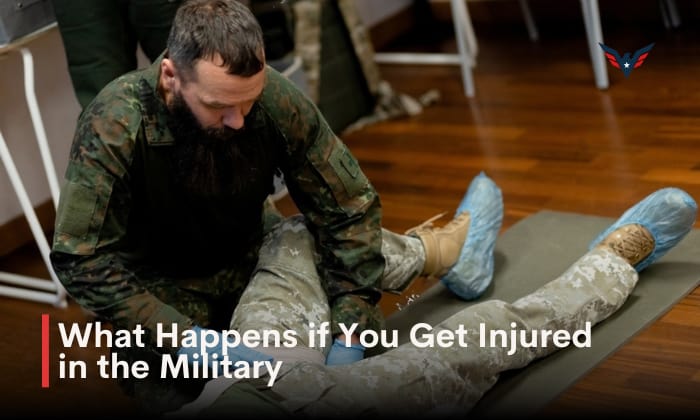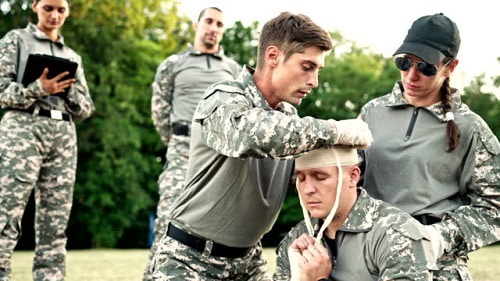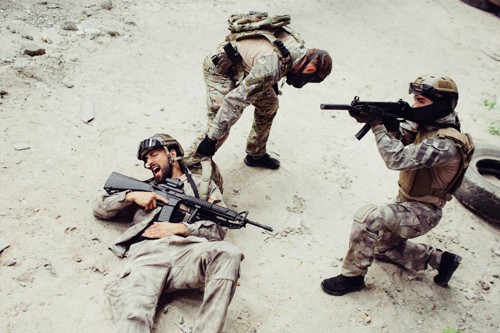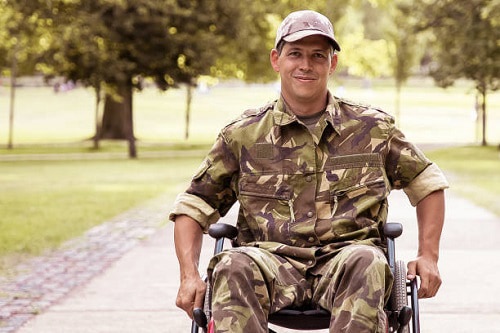Regarding what happens if you get injured in the military, injuries are an inevitable outcome of the military personnel’s unyielding dedication to their job and safeguarding the troop’s welfare.
Soldiers may receive primary care and deserved benefits for non-self-inflicted injuries occurring during service. Additionally, if they incur severe injuries that hinder them from continuing their old duties, they may be eligible for a medical discharge with appropriate benefits.
However, It is important to note that the military demands accurate documentation to obtain adequate compensation.
Table of Contents
Benefits for Service Members Who Are Injured
You could be asking, what happens if you get injured while on active duty and off service?
Service personnel can sustain military injuries in various situations, such as during training exercises, blasts or firearms incidents, military vehicle accidents, combat injuries, weather-related incidents, falls from great heights, crush injuries, and injuries caused by military equipment.
Furthermore, the most frequently encountered military injuries include Post-Traumatic Stress Disorder (PTSD), second and third-degree burns, spinal cord trauma, bones breaking apart, paralysis, loss of hearing and sight, limb loss and impairment, shrapnel wounds, nerve damage, and brain injuries.
Overall, the military offers crucial support and benefits to injured soldiers, helping them navigate recovery and rehabilitation effectively.
Let’s discuss the various circumstances and benefits available to injured military personnel.
Types of Injuries in the Military
1. Injuries Incurred During Basic Training
In the military, it is not impossible to get hurt in basic training because of the rigorous physical demands involved.
In a survey done on Indeed in 2018, the respondents claimed that injured recruits in basic training get benefits. The sole stipulation is that the injury must be training-related and not pre-existing.
The military provides different benefits based on the severity of your injury:
- Minor pain, discomfort, or sickness like a cut or a cold: get treated immediately, rest if needed, and then return to your basic training
- Acute injuries such as ligament tears or fractures: demand prompt care. Often requires prolonged treatment and rehabilitation.
- If your case lasts for weeks: take convalescent leave and participate in the Warrior Training and Rehabilitation Program before resuming your training.
Depending on your medical evaluation and if your injury is too grievous, you can no longer continue with your duty or training.
In such a situation, you can be medically discharged and have the advantage of receiving VA disability compensation or any applicable military accident claims.
Carefully document everything relevant to your illness or injury to ensure you obtain the proper compensation.
2. Injuries Incurred During Active Duty
When an active duty service member gets injured, they may be eligible for benefits such as medical programs, assistance services, and allowances alongside their base pay and wages.
Active military personnel can receive various privileges when injured, though this depends on the severity of their injuries and their respective branches. Typically, each branch’s Recovery Care Coordinator follows set guidelines:
- The Marines: injured soldiers may continue to receive the same salary and entitlements
- The Army, National Guard and Reserves: offer benefits based on the dictated guidelines set by their units
Compensation For The VA Disability
Did you know that when a military personnel gets injured, the military follows a guideline known as the VA Disability Ratings? This system matches the graveness of your illness to the amount you get paid if you get injured in the military.
Here are some examples of injuries and illnesses for different levels of disability ratings:
- 100% disability rating for certain disability benefits: two to four amputated or paralyzed limbs, cancer, PTSD, brain injury discharge, and severe depression syndrome
- 10% disability rating: back pain, tinnitus, or scars depending on the extremity
You can also check this list of injuries and illnesses to find the corresponding disability ratings that match.
Furthermore, the Department of Veterans Affairs has updated the disability compensation pricing for 2023.
Different percentages of the VA disability rating are associated with various compensation payments.
Please note that all monetary remuneration is tax-free for all percentages. Here’s an overview of some of the financial aid advantages that exist:
- Rates under 10 – 20%: standard monthly payment for injured soldiers, which stays the same regardless if you have a dependent parent, kid, or spouse.
For instance, it is US$165.92 for 10% and US$327.99 for 20%.
- Rates 30% – 100%: the monetary benefits will vary based on the injured soldier’s dependent status.
This status can include various scenarios, such as having no dependents, having a spouse without children, with children, with 1 or 2 parents, or being a veteran.
Additionally, those with the dependent status of a spouse receiving aid and attendance receive an additional amount. And for reservists to be eligible for VA disability compensation, the illness, injury, or reservist injury must occur during active duty or training
For more comprehensive details, please refer to this page.
Moving along, here are the four options on how to apply for VA disability compensation:
- Claiming it online
- By mail or physical appearance in the nearest VA regional office
- Guidance from a trained professional like Lawyers or Claim Agents
- The appeal process
3. Injuries Incurred During Inactive Duty Training
- Must complete at least two hours of service training: to qualify for illness or injuries compensation during inactive duty training
- The most acceptable disabilities for compensation: injuries, strokes, or heart attacks.
Additionally, some programs may demand agreed-upon active service days.
4. Injuries Incurred During Off Duty
A soldier getting injured while off-duty in the military may generate a lot of problems.
If you are a military personnel on active duty from the time of your enlistment to the time of your release and you get into an accident while on leave, you may be eligible for VA disability pay as long as your injuries are known to cause disability.
However, if you are not on active duty and have a status of absent without leave (AWOL), no compensation applies when your injury results from your blatant misbehavior.
Proper Documentation for Military Injury or Illness
Here is an overview of how to properly document your injury or illness:
- Get an official copy of medical records, including lab tests, ultrasounds, and X-rays.
- Medical information from the treatment you had while in the military
- Any service-related paperwork about your state of health
- Supporting evidence related to your health issue from friends, relatives, religious community members, or law enforcement personnel
- Documentation supporting your medical situation or status from friends, family members, or law enforcement officers
Conclusion
We can better identify the benefits and compensation that soldiers authentically deserve now that we understand what happens if you get injured in the military.
Remember that soldiers are known to be dignified personnel. When you are off duty and have an accident, ensure it was not intentional or due to misbehavior; otherwise, you will not receive proper compensation.
If you are a soldier or a relative of injured military personnel, share this information to help them know about their benefits.

I am Everett Bledsoe, taking on the responsibility of content producer for The Soldiers Project. My purpose in this project is to give honest reviews on the gear utilized and tested over time. Of course, you cannot go wrong when checking out our package of information and guide, too, as they come from reliable sources and years of experience.







